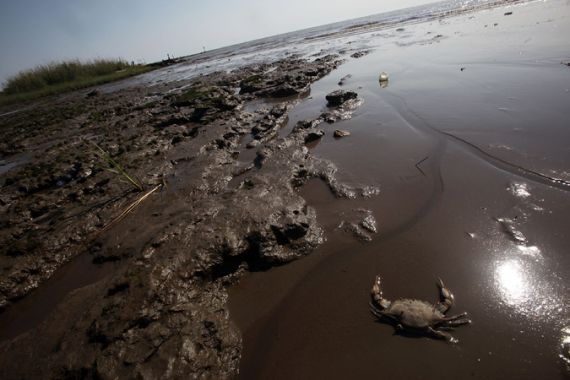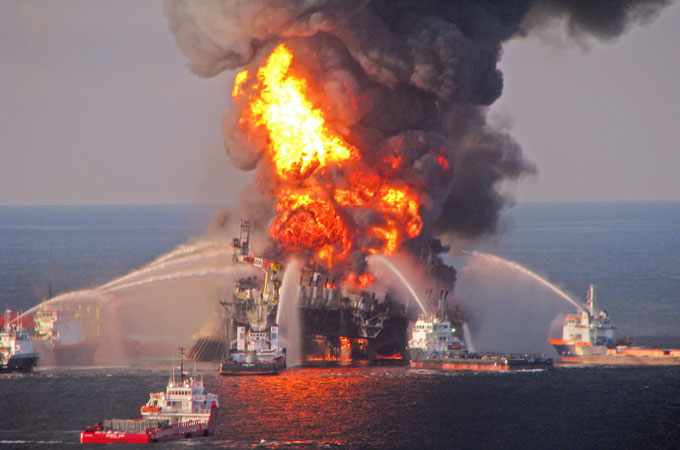US report spreads blame for Gulf oil spill
Federal report finds BP, Transocean and Halliburton, all responsible for disaster last year that left 11 people dead.

 |
| The disaster caused billions of dollars in damage to hundreds of kilometres of coastline [EPA] |
A key US government report has placed “ultimate responsibility” for the Gulf of Mexico oil spill on BP, citing a bad cement job and poor management decisions by the company and its subcontractors.
The Deepwater Horizon blast in April 2010 left 11 workers dead and caused an estimated four million barrels of oil to be spilled into the Gulf.
Keep reading
list of 4 itemsTurtles swimming to extinction in Malaysia as male hatchlings feel heat
Could shipping containers be the answer to Ghana’s housing crisis?
Thousands protest against over-tourism in Spain’s Canary Islands
The report said that in the days leading up to the disaster, BP made a series of decisions that complicated cementing operations, added risk, and may have contributed to the ultimate failure of the cement job to seal the well that failed in the run-up to the blast.
The details were contained in the final report from an investigation team of the US Coast Guard and the Bureau of Ocean Energy Management Regulation and Enforcement, the agency that regulates offshore drilling.
The findings are likely to strengthen UK-based BP’s legal case for spreading the massive costs of the spill with Halliburton, which performed the cement job, and rig owner Transocean.
The panel held hearings in the year following the disaster and their investigation, among a number that have been produced, was among the most exhaustive.
BP ‘ultimately responsible’
Other investigations have also blamed multiple factors for the disaster, faulting misreadings of key data, the failure of the blowout preventer to stop the flow of oil to the sea and other shortcomings by executives, engineers and rig crew members.
 |
| Click here for more of Al Jazeera’s special coverage |
The joint investigation team laid considerable blame on BP’s shoulders.
The panel said BP failed to communicate certain key decisions and increasing operational risks to Transocean.
While the report recognises that other companies had roles in the disaster, the panel said that BP was the final decision maker.
“BP, as the designated operator under BOEMRE regulations, was ultimately responsible for conducting operations at Macondo in a way that ensured the safety and protection of personnel, equipment, natural resources, and the environment,” the panel concluded.
The panel recommended further changes to offshore drilling practices.
BP said in a statement that the company accepts the report’s conclusion that the accident was the result of multiple causes involving multiple parties. BP did not address any of the report’s specific conclusions.
“From the outset, BP acknowledged its role in the accident and has taken concrete steps to further enhance safety and risk management throughout its global operations, including the implementation of new voluntary standards and practices in the Gulf of Mexico that exceed current regulatory requirements and strengthen the oversight of contractors,” BP said.
“We continue to encourage other parties to acknowledge their roles in the accident and make changes to help prevent similar accidents in the future.”
‘Blind decisions’
Transocean and cement contractor Halliburton did not immediately respond to requests for comment.
The report paints a dark portrait of the final hours aboard the Deepwater Horizon, where the workers in the most danger, on the drilling floor of the rig, were unaware of the anomalies being detected by engineers looking at data coming from the well.
Joe Yerkes, who was made sick from being exposed to chemicals while working doing oil cleanup in BP’s Vessels of Opportunity programme, hopes the report will help him obtain compensation that BP has promised those effected by the oil disaster.
“I consider myself a tough person, but this has been the hardest thing I’ve ever had to go through,” Yerkes said of his health problems, and subsequent financial struggles.
“I’m financially destroyed, and my health is bad – I’m having to cut off parts of my treatment because I can’t afford it all, and I’m just trying to survive.”
Al Jazeera’s Dahr Jamail, reporting from New Orleans, Louisiana, said while the report could improve things for thousands of Gulf residents who have filed lawsuits against BP, it will be a long time before litigation brings the financial relief people are so desperate for.
The federal team also charges that BP made decisions blindly, without assessing risk, and in some cases skipping internal processes the company relied on to evaluate the potential dangers of decisions.
While this report and others blame BP for jeopardising safety to cut costs, the federal panel went further and examined the 2009 performance evaluations of thirteen BP employees involved on the well.
All but one of the reviews cited cost savings when evaluating the employees’ work.
In addition to the rig worker deaths, the resulting oil spill off Louisiana spewed more than 200 million gallons of crude from an undersea well owned by BP.
The disaster caused billions of dollars in damage to hundreds of kilometres of coastline and wreaked havoc on the Gulf economy.